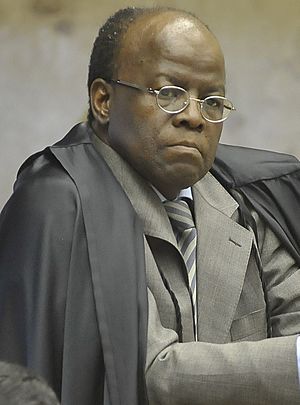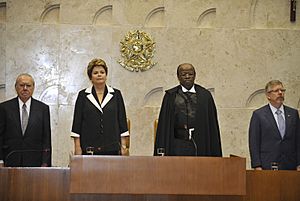Joaquim Barbosa facts for kids
Quick facts for kids
Joaquim Barbosa
|
|
|---|---|

Barbosa in 2012
|
|
| Justice of the Supreme Federal Court | |
| In office June 25, 2003 – July 31, 2014 |
|
| Appointed by | Luiz Inácio Lula da Silva |
| Preceded by | Moreira Alves |
| Succeeded by | Edson Fachin |
| 56th President of the Supreme Federal Court | |
| In office November 22, 2012 – July 31, 2014 |
|
| Vice President | Ricardo Lewandowski |
| Preceded by | Ayres Britto |
| Succeeded by | Ricardo Lewandowski |
| Personal details | |
| Born |
Joaquim Benedito Barbosa Gomes
October 7, 1954 Paracatu, Minas Gerais, Brazil |
| Political party | PSB (2018–present) |
| Spouse |
Marileuza Francisco de Andrade
(m. 1980; div. 1987) |
| Children | Felipe |
| Alma mater | University of Brasília Panthéon-Assas University |
|
Other judicial positions
2012–2014: President, National Justice Council
2012–2012: Vice President, Supreme Federal Court 2012–2012: Vice President, National Justice Council 2008–2010: Vice President, Superior Electoral Court 2006–2008: Effective Justice, Superior Electoral Court 2006–2006: Substitute Justice, Superior Electoral Court |
|
Joaquim Benedito Barbosa Gomes was born on October 7, 1954. He is a very important person in Brazil's legal history. He used to be a Justice, which is like a judge, at the Supreme Federal Court. This is the highest court in Brazil.
From 2012 to 2014, he was the President of this court. This means he was the Chief Justice. He was the first Black person to hold this top position.
In 2013, Time magazine chose him as one of the 100 most influential people in the world. This shows how important his work was.
Contents
Early Life and Education
Joaquim Barbosa grew up in a family where his father was a bricklayer and his mother was a housewife. He was the oldest child. He started school in his hometown in Brazil. Later, he finished his schooling in Brasília.
Before going to college, he worked hard. He had jobs as a cleaner and a typesetter. A typesetter arranges text for printing. These jobs helped him pay for his education.
He studied law at the University of Brasília. He graduated in 1979. Later, he continued his studies in France. He earned a master's degree in 1990 and a doctorate in 1993 from Panthéon-Assas University. In 2015, he received an honorary doctorate from Hebrew University.
Early Career
After finishing law school, Joaquim Barbosa started working for the Brazilian government. He joined the Brazilian diplomatic service. This is like working for the country's foreign affairs department. His first job was in Helsinki, Finland.
He also worked as a professor at Rio de Janeiro State University. He was a visiting scholar at important law schools in the United States. He visited the Human Rights Institute at Columbia Law School in New York City. He also visited UCLA School of Law in California.
Besides his diplomatic work, he was a public servant for other Brazilian departments. He also worked as a public prosecutor. This means he represented the government in legal cases.
Joaquim Barbosa is also very good with languages. He learned to speak French, Spanish, English, and German fluently.
Supreme Federal Court
Joaquim Barbosa became a Justice of the Supreme Federal Court on June 25, 2003. He was chosen for this important role by President Luiz Inácio Lula da Silva.
His Role as a Justice
As a Justice, Joaquim Barbosa was involved in many important legal cases. He was the main judge, called the judge rapporteur, for a very significant case known as Criminal Action 470. This case was about important issues in Brazil.
He was known for handling many cases. In November 2012, he was responsible for over 8,460 cases.
Joaquim Barbosa has a health condition called sacroiliitis. This makes it uncomfortable for him to sit for long periods. Because of this, he was often seen standing up during court sessions.
Becoming President of the Court

On November 17, 2012, Joaquim Barbosa became the acting president of the Supreme Federal Court. He was already the Vice-President. He was chosen by his fellow judges to be the next President in October 2012. This followed a tradition where the oldest member who had not yet served as president would be elected.
He officially started his term as President on November 22, 2012. Many important people attended the ceremony. These included President Dilma Rousseff and Senate President José Sarney.
2018 Presidential Election
In 2018, Joaquim Barbosa joined a political party called the Brazilian Socialist Party (PSB). Many people thought he might run for president in the 2018 Brazilian general election. Early polls showed that he was quite popular, with about 10% of people saying they would vote for him. This placed him in third place among potential candidates. However, he decided not to run for president in the end.
Key Ideas and Beliefs
Joaquim Barbosa has strong beliefs about how justice should work. He believes that everyone should be treated fairly in the legal system. He has spoken out against special treatment for powerful people. He thinks that judges should focus on the most important parts of a case.
He also believes that lawyers should have the right to speak directly with judges. This helps make sure that all sides of a case are heard. He supports transferring cases about forced labor to federal courts. This helps ensure these serious cases are handled properly.
Legal Consultancy
After serving as a Justice and President of the Supreme Federal Court, Joaquim Barbosa retired from public service. He is now a legal consultant. This means he uses his knowledge and experience to advise others on legal matters.
He is still a strong supporter of learning and education. A Brazilian news magazine once called him "the poor boy who transformed Brazil." This shows how much he achieved and how he inspired many people.
See also
 In Spanish: Joaquim Barbosa para niños
In Spanish: Joaquim Barbosa para niños
 | DeHart Hubbard |
 | Wilma Rudolph |
 | Jesse Owens |
 | Jackie Joyner-Kersee |
 | Major Taylor |

